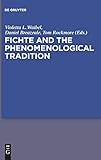Fichte and the Phenomenological Tradition / Violetta L. Waibel, J. Daniel Breazeale, Tom Rockmore.
Material type: TextPublisher: Berlin ; Boston : De Gruyter, [2010]Copyright date: ©2010Description: 1 online resource (425 p.)Content type:
TextPublisher: Berlin ; Boston : De Gruyter, [2010]Copyright date: ©2010Description: 1 online resource (425 p.)Content type: - 9783110245295
- 9783110245288
- online - DeGruyter
| Item type | Current library | Call number | URL | Status | Notes | Barcode | |
|---|---|---|---|---|---|---|---|
 eBook
eBook
|
Biblioteca "Angelicum" Pont. Univ. S.Tommaso d'Aquino Nuvola online | online - DeGruyter (Browse shelf(Opens below)) | Online access | Not for loan (Accesso limitato) | Accesso per gli utenti autorizzati / Access for authorized users | (dgr)9783110245288 |
Frontmatter -- Contents -- List of Abbreviations -- Introduction -- I. Fichte's Wissenschaftslehre as a Phenomenology -- On Fichte and Phenomenology -- The Concept of Phenomenology in Fichte's Wissenschaftslehre of 1804/II -- Reduction or Revelation? Fichte and the Question of Phenomenology. -- Fichte's Phenomenology of Religious Consciousness -- Fichte and Brentano: Idealism from an Empirical Standpoint and Phenomenology from an Idealist Standpoint -- II. Fichte and Husserl -- Phenomenologies of Intersubjectivity: Fichte between Hegel and Husserl -- Tendency, Drive, Objectiveness. The Fichtean Doctrine and the Husserlian Perspective -- Life-World, Philosophy and the Other: Husserl and Fichte -- Self-Consciousness and Temporality: Fichte and Husserl -- Body and Intersubjectivity: The Doctrine of Science and Husserl's Cartesian Meditations -- III. Fichte and Heidegger -- Martin Heidegger Reads Fichte -- Fichte, Heidegger and the Concept of Facticity -- Overcoming the Priority of the Subject: Fichte and Heidegger on Indeterminate Feeling and the Horizon of World and Self-Knowledge -- IV. Fichte, Sartre and Others -- How to Make an Existentialist? In Search of a Shortcut from Fichte to Sartre -- Consciousness. A Comparison between Fichte and the Young Sartre in a Bio-Political Perspective -- Fichte and Levinas. The Theory of Meaning and the Advent of the Infinite -- The Other and the Necessary Conditions of the Self in Fichte's Wissenschaftslehre and Paul Ricoeur's Phenomenology of the Will -- Does the Methodology of Phenomenology Involve Dual Intentionality? Some Remarks on Conceptions of Phenomenology in Husserl, Fichte, Hegel, Sartre and Freud -- Fichte's Logical Legacy: Thetic Judgment from the Wissenschaftslehre to Brentano -- Backmatter
restricted access online access with authorization star
http://purl.org/coar/access_right/c_16ec
This volume is a collection of previously unpublished papers dealing with the neglected "phenomenological" dimension of the philosophy of Johann Gottlieb Fichte, which it compares and contrasts to the phenomenology of his contemporary Georg Wilhelm Friedrich Hegel and to those of Edmund Husserl and his 20th century followers. Issues discussed include a comparision of the early phenomenological method in Fichte and Hegel with the classical phenomenological method in Husserl, Heidegger and Sartre, as well as special topics, namely the problem of self-consciousness and intersubjectivity, very important in Fichte's trancendental philosophy of the Wissenschaftslehre but discussed as well in 20th century phenomenology. Fichte can be said to have invented the theory of intersubjectivity that was first developed by Hegel and then by Husserl, Sartre or Ricœur. Fichte can also be said to have in fact promoted a theory of intentionality based on tendencies, drives, purposes and will, that got a modern shape and language by Husserl and his followers. And even the deduction of the human body in Fichte's practical parts of the Wissenschaftslehre prepares the path for modern twentieth century theories of body, feeling and mind.
Mode of access: Internet via World Wide Web.
In English.
Description based on online resource; title from PDF title page (publisher's Web site, viewed 08. Jul 2019)


